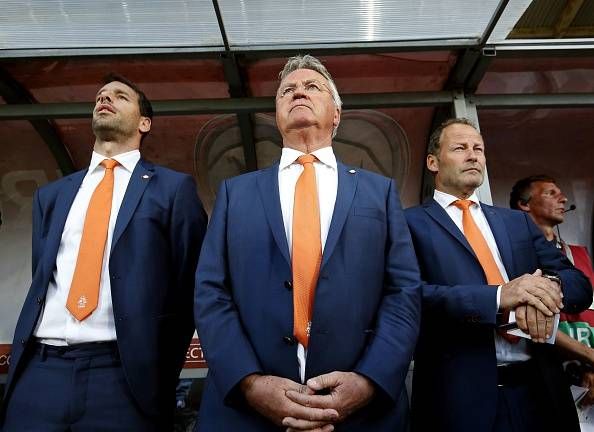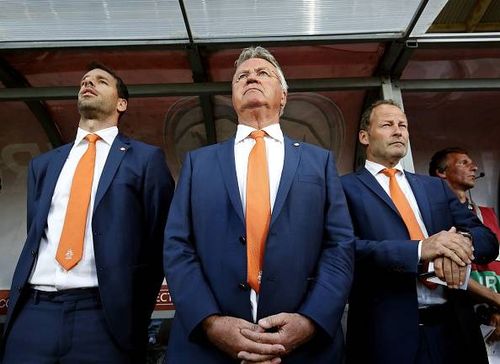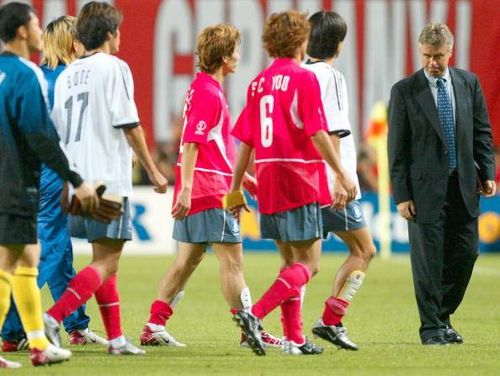
The glory and the fall of Guus Hiddink

“I am sorry it went this way.”
He is known to leave on his own terms but the end of his recent term as the Oranje boss would have been a rather bitter pill to swallow for Guus Hiddink. He resigned as manager of the Dutch national side yesterday thereby ending his second spell there.
While one could be sad at how all of this turned out, there is no denying that many believed that such a situation could arise when Hiddink was appointed after the World Cup. Louis Van Gaal’s boys’ performance exceeded all expectations as they went on to finish third in Brazil.
Hiddink’s second stint started with a 2-0 defeat at the hands of Antonio Conte’s Italian side. Defeats against the likes of the Czech Republic and Iceland followed. Against the United States of America, the side conceded three goals thereby throwing away a two-goal lead to eventually lose 4-3.
There was a draw against his former employers Turkey and unconvincing wins against Kazakhstan, Latvia and a friendly win against Spain. But these results did little to save his job. He refused to learn from his mistakes and was too late in dropping ageing players. Under him, the side won four out of ten games and conceded 15 goals in what was becoming a gloomy spell.
The announcement of Hiddink’s appointment was made before the showpiece event and it would not be wrong to say that there was pressure on him right from the start. One of the many reasons behind the KNVB appointing the former the Real Madrid, PSV and Chelsea boss was to give him a fitting farewell. This was perhaps his last assignment before calling it a day.
Yet when you come to think of it, Guus Hiddink was never really the right man to succeed the current Manchester United manager. Ever since guiding Chelsea to the FA Cup triumph in 2009, Hiddink’s stock has been on the wane. He failed to ensure qualification for Turkey to Euro 2012 and was just about decent as manager of Russian side Anzhi Makachakala.
However, the last ten months can’t take away the fact that the man born in Varsseveld in the Netherlands is a legend of the game of football. He was not really one of the great players to have come out of Holland. Yet in those days, the Dutch were in great demand. Hiddink last played at the San Jose Earthquakes along with the legendary George Best. As the book “Socceronomics” puts it, he was best remembered then as the Manchester United great’s roommate.
After retiring as a player, Hiddink jumped right into management. He was the assistant manager at PSV before eventually taking charge of the club. He guided the side to the three Eredivisie titles and the European Cup in 1988. Stints at Fenerbahce and Spanish giants Valencia followed before his first stint as Holland manager.
His greatest achievement during that reign was keeping internal squabbles in check in a superstar team. He guided the side to the semi-finals of the World Cup in 1998 before resigning. Short spells at Real Madrid and Real Betis followed before Guus took over as the manager of the South Korean national side.

With South Korea co-hosting the World Cup in 2002, it was important for the hosts to put in a good performance. In spite of not having a good start, the team quickly adapted and put in a dream-like performance at the event. There were wins against Poland, Portugal, Italy and Spain. The side led by Hong Myung-Bo reached the semi-finals thereby surpassing the achievements of their northern neighbours.
This was a political victory for the public and Hiddink by then had achieved God-like status in South Korea. He left that job and returned to PSV and the side again to three Eredivisie titles.
He then assumed charge of the Australian national side and guided them to the World Cup for the first time in 32 years. His success in guiding andn transforming the side earned him a great reputation in the country with chants like “No Guus, No Glory” and “Guus for PM” becoming common.
After the World Cup, he was appointed manager of the Russian national side and just like the previous occasions, he guided Russia to the semi-finals of Euro 2008 against all odds. There was a time when every developing footballing nation wanted him. His ability to transform underperforming teams into sides that would make the world sit up and take notice is what separated him from many great managers of his time.
Guus Hiddink has achieved a lot in the game but maybe time has come to call it a day. For a man who has a stadium named after him in Gwangju, South Korea, the last ten months have been a blemish on an otherwise glorious career. Hiddink might be itching to have a go at another job one last time but he is well past his peak. Having been in this line of work for almost thirty years now, there is no doubt that Guus Hiddink is short on energy and desire right now.